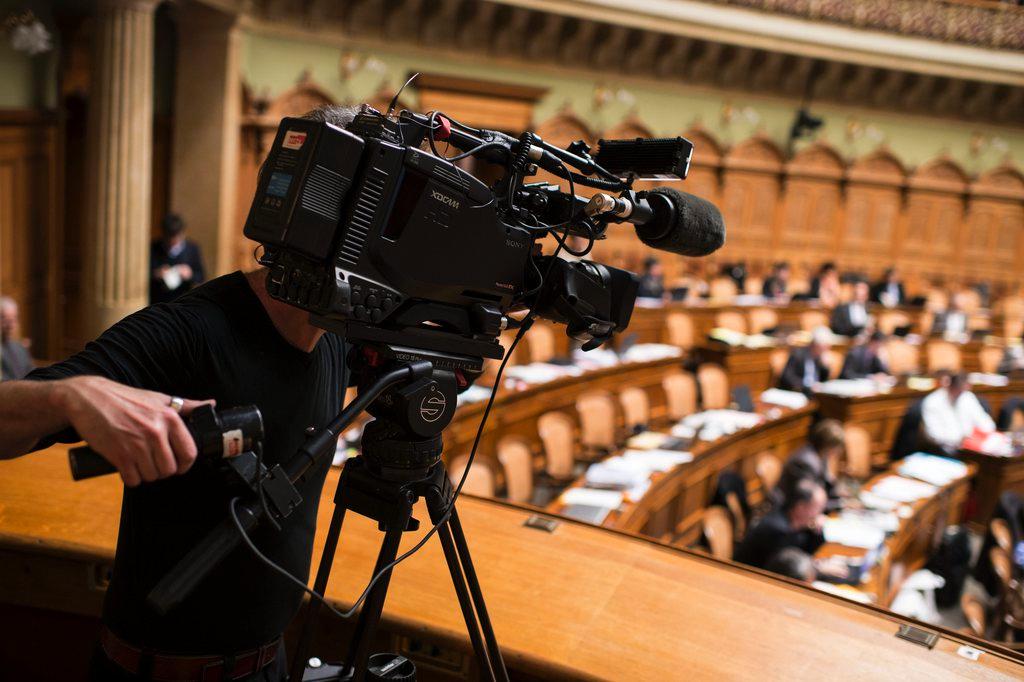‘Increasing media diversity, protecting minorities’
Lower fees, more fairness, less bureaucracy: the new law on radio and television is a response to the changed media situation and strengthens both the Swiss Broadcasting Corporation (SBC) and individuals. It would boost (linguistic) diversity in Switzerland's public media.
Topics such as healthcare costs, security, transport and agriculture attract a lot of media coverage. Many politicians are keen to make punchy statements and show their expertise in such debates.
It’s quite a different picture when media policy is at stake: Debates on this issue have indeed had a very low profile in Switzerland. Which is not justified at all.
The media play a vital role in a direct democracy, and Switzerland – with its four national languages – needs a diverse media scene that guarantees a range of opinions with a high standard of journalistic quality.
This is the only way for Swiss citizens to form their own opinions and take decisions on political matters – more than ever in a world which is becoming increasingly digitised and globalised.

The amended radio and television law is a step to boost the media sector in Switzerland. From the very outset of the discussions this issue has been of fundamental interest to me as a representative of Romansh – the smallest national language community, which would not have any radio or television broadcasts without a strong SBC.
The members of the committee on transport and telecommunications in the House of Representatives elected me as their speaker to advise the parliamentary chamber on this issue.
Technology
Under the current law the licence fee is linked to the existence of radios and televisions. Anyone who has a television or a radio must pay a fee.
However, as a result of technological progress every computer, every iPhone and iPad is also a TV and radio. Programmes can be seen and heard easily and anywhere via the internet. Therefore virtually all households would have to pay today.
But in reality many households do not pay any fee and there are licence dodgers, especially among companies.
Just 7% of companies pay their dues, implying that 93% of companies do not have access to a radio or television. This situation clearly illustrates that the current system is unjust. The honest members of society pay for those who cheat.
Moreover, a great deal of bureaucracy and meddlesome inspectors are required to crack down on licence dodgers. The current system has hardly any advantages. It is unfair and no longer appropriate in our day and age. The new law will put an end to this untenable situation.

More
Beware of a new tax trap: no to the media tax
Surprisingly, the Association of Small and Medium-Sized Enterprises (SMEs) wants to retain all the disadvantages of the existing system.
It has launched a referendum against the law and claims that companies would also have to pay CHF200 million ($209 million), effectively introducing a new tax. But this is not true.
Exemptions
On the contrary. Under the new law, 75% of all companies in Switzerland would be exempt from the fee and – quite legally – no longer contribute anything.
SMEs in particular would benefit from this rule. Firms would only pay fees from an annual turnover of CHF500,000. And a further 9% of companies would pay less than before under the amended law.
Overall, more than four out of five companies will benefit from the new law as they would pay lower fees or none at all.
Despite this the SME association has challenged the parliamentary decision – which is an utter mystery to me.
However, some members of the association are not easily fooled: for example, the umbrella organisation of the hotel and restaurant sector, Gastrosuisse, has come out in favour of the new law and rejects the referendum.
Reduction
The new law also has advantages for private households: the annual fee could be reduced from CHF462 to around CHF400, according to the government.
This amounts to a 15% reduction for households. And they would pay only once. There would no longer be additional fees for owners of holiday homes.
The legal reform is not only an opportunity to improve the funding system for public services but also to strengthen private media.
They are the real winners: in future they would receive up to CHF26 million more from the licence revenues.
This injection of funds is urgently needed and would place the future of private radio and TV stations on a firm footing. And contrary to what has been said by some critics, the SBC would not receive any additional funding.
In short: the revised law means lower fees, more fairness, less bureaucracy and it provides for a far-sighted funding system of our radio and TV programming. This is crucial for a federal state made up of 26 different cantons and with four national languages.
Anyone who is proud of Switzerland will appreciate domestic media diversity, independent and home-grown productions. This is why they should say Yes to the amended radio and television law on June 14.
The views expressed in this article are solely those of the author, and do not necessarily reflect the views of swissinfo.ch – a unit of the SBC.
swissinfo.ch publishes op-ed articles by contributors writing on a wide range of topics – Swiss issues or those that impact Switzerland. The selection of articles presents a diversity of opinions designed to enrich the debate on the issues discussed.
Translated from German

In compliance with the JTI standards
More: SWI swissinfo.ch certified by the Journalism Trust Initiative

You can find an overview of ongoing debates with our journalists here. Please join us!
If you want to start a conversation about a topic raised in this article or want to report factual errors, email us at english@swissinfo.ch.